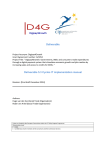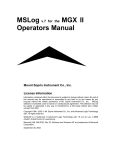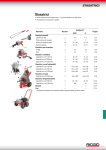Download FocusOPEN Scripting & API Overview FocusOPEN Scripting & API
Transcript
FocusOPEN Scripting & API Overview
1 February 2012
Revision: 1
Notes
The information applies to the 3.3.9.5 release and above. Specific reference is made to
3.4.2 functionality in the pre-written API calls.
Contents
Overview .............................................................................................................. 2
Scripting & API Architecture ..................................................................................... 2
REST API ............................................................................................................... 2
Authentication Theory ............................................................................................. 3
FocusOPEN Web Application Automatic Client-Side API Session Token Binding ............ 4
Authentication Example........................................................................................... 4
Data Node ............................................................................................................ 5
Error Node ............................................................................................................ 5
Writing API Calls .................................................................................................... 5
Pre-Built Example API Calls ..................................................................................... 7
Audit Trail & Logging.............................................................................................. 8
Appendix A - REST API Settings ................................................................................ 9
Appendix B - API Error Codes ................................................................................ 10
© FocusOPEN Software 2012 All Rights Reserved
FocusOPEN Digital Asset Manager™ is a trademark of FocusOPEN Software
Overview
The FocusOPEN Scripting & API facility enables custom features and control of the
FocusOPEN system without directly modifying the core application and making it
incompatible with future updates. The API is a relatively recent addition to FocusOPEN and
new functionality is being added with each new release.
Scripting & API Architecture
There are two elements to the FocusOPEN extensibility architecture: the scripting engine
and the REST API. The Scripting Engine allows custom server-side JavaScript scripts to be
developed and called. The REST API is authored using the Scripting Engine and mediates
Calls to scripts. FocusOPEN uses the Jint JavaScript scripting engine to provide a serverside JavaScript scripting facility that can be used to extend FocusOPEN.
The chain of execution is:
The preferred method of calling scripts is using the REST API but it is technically possible to
initiate a script.
REST API
The REST API uses JSON as the default protocol for exchanging data. Most current Calls
are made using http GET requests (with POST planned for some up-coming API Calls).
© FocusOPEN Software 2012 All Rights Reserved
FocusOPEN Digital Asset Manager™ is a trademark of FocusOPEN Software
Page 2
Authentication Theory
To access API methods, the client must login using a persistent User API Token linked to a
FocusOPEN user account. Upon successfully logging in, a session token is returned. The
session token is used to verify that the user is logged in. The user must pass a session token
for every operation.
User API Token
Every user created in FocusOPEN has an API token created as soon as their account is
added or they validated following registration. An API token is used to avoid passing
around their actual password (or the hashed equivalent of it).
In the user management page, the user's User API Token is displayed and a link next to it:
regenerate token. If this is clicked, a new token is created. This feature is to allow the User
API Token to be changed if necessary.
Obtaining a Session Token
The process of obtaining a session token is to make an API call to login. If the login is
successful, a session token is returned, this is a random identifier which will only persist for
the duration of the session. The session details are recorded in two fields in the User table:
•
•
Session API Token
Last API Operation Date/Time
The last API operation date/time is updated each time an API operation is successful
(including initially logging in). If the user logs out (either via the API or using the web
interface) the Session API Token is reset to null.
Validating a Login Using the Session API Token
When an API operation is called this process occurs:
1. The session token is checked against the user table to see if it corresponds to a
recognised user.
2. If the session token is not found, the operation is rejected.
3. If the session token matches but the current date/time is later than the last
successful operation plus the default session length of the web application then the
operation fails because the session has expired.
Assuming all conditions are satisfied, the API call is permitted.
© FocusOPEN Software 2012 All Rights Reserved
FocusOPEN Digital Asset Manager™ is a trademark of FocusOPEN Software
Page 3
FocusOPEN Web Application Automatic ClientClient-Side API Session Token
Binding
The API can be used by client-side scripts contained on custom home pages or your own
preview plug-ins from within the FocusOPEN application itself. There is an automatic
client-side binding on every FocusOPEN page so if calling API functions, it is not necessary
to login twice and/or expose the User API token (which could be accessed by other visitors
viewing the source of the page).
The JavaScript function template is as follows:
function getAPISessionToken(){
return "[session token]";
}
Where [session token] = the session token received. The session token is transient so must
be checked prior to each operation. Any client-side code built into FocusOPEN can then
use this automatically.
Authentication Example
The following shows an example of how authentication is carried out:
[URL]/scripts.REST.users.login.ashx?userAPIToken=[User API Token]
Example:
[URL] = http://localhost/focusopen/
[User API Token] = fffd50fe65fa9feeb1e16c78e00aa4b2
The Call would be:
http://localhost/focusopen/scripts.REST.users.login.ashx?userAPIToken=fffd50fe65fa9feeb
fffd50fe65fa9feeb
http://localhost/focusopen/
1e16c78e00aa4b2
4b2
1e16c78e00aa
If the API token is correct, FocusOPEN will return:
{"call":"login","data":{"sessiontoken":"[Session
Session Token]"},"datime":"[JSON
Format
Token
Time]","errors":{"code":0,"description":"Successful"},"requestid":"[Request
Hash]","responseid":"[Response Hash]"}
Example:
{"call":"login","data":{"sessiontoken":"79e46e7c
79e46e7c79e46e7c-81058105-41614161-bbe6bbe69642027051b4"},"datime":"\/Date(1328485501181+0000)\/","errors":{"code":0,"descript
9642027051b4
ion":"Successful"},"requestid":"d8bf928c-e9f1-45af-8fde5b68ea76f1cc","responseid":"79f55e46-8b42-4180-a57b-5d5c79c570be"}
The sessiontoken key is the significant item of information from this. A session token is
required for every API operation.
© FocusOPEN Software 2012 All Rights Reserved
FocusOPEN Digital Asset Manager™ is a trademark of FocusOPEN Software
Page 4
Data Node
The key information from every response is contained within the data node. This contains
the results of any API Call you might issue.
Error Node
The error code node details the specific error with the Call and is included with every
response. An error code of zero (0) means the operation was successful. Negative error
codes mean that the Call failed (see Appendix B for a list of current codes). Positive error
codes mean that the Call succeeded but there were potential warnings or other issues that
should be assessed.
Writing API Calls
As explained earlier, it is possible to author your own API calls in JavaScript. The following
is template you can use for writing your own Calls:
function [Call Name]([Parameters]) {
if ([error condition]) {
this.SetResponseError([error code]);
return;
}
var data = { '[data key]': [value], 'version': success };
this.SetResponseData(data);
}
Example:
This is the newassetversion call code:
function newassetversion(assetid) {
var id = FocusOPEN.Shared.NumericUtils.GetIntValue(ToInt32(assetid), 0);
var asset = FocusOPEN.Data.Asset.Get(id);
var version = 0;
if (asset.IsNull) {
this.SetResponseError(-10004); //asset does not exist
return;
}
FocusOPEN.Business.AssetVersionManager.Instance.SaveToNewVersion(asset,
this.getUser());
version = asset.VersionNumber;
var data = { 'assetid': assetid, 'version': success };
this.SetResponseData(data);
}
Script Storage & Access
Scripts are stored in the folder: Scripts\REST\Assets
The format for accessing the Call is
[URL]/scripts.REST.[folder].[call].ashx?userAPIToken=[User API Token]&[parameter
name]=[value]
© FocusOPEN Software 2012 All Rights Reserved
FocusOPEN Digital Asset Manager™ is a trademark of FocusOPEN Software
Page 5
Example, this would call the process pending imports Call which will automatically ingest all
assets for users in brand 1 that had been placed into the
/data/imports/[brand]/[user]/manual folder
http://localhost/focusopen/scripts.REST.assets. processpendingimports.ashx
?SessionAPIToken=5af78503-e826-4267-a4c3-416619499f1a&brandid=1
Nullable Integers
If you make Calls that reference integers like Asset IDs, you will find you cannot use them
directly without first converting the type to nullable integers (these are integers that can be
used with databases). There is no native JavaScript method for doing this, but one has
been provided in FocusOPEN which you can use via this template:
FocusOPEN.Shared.NumericUtils.GetIntValue(ToInt32([Integer]), 0);
© FocusOPEN Software 2012 All Rights Reserved
FocusOPEN Digital Asset Manager™ is a trademark of FocusOPEN Software
Page 6
PrePre-Built Example API Calls
At the time of writing there are the following pre-built API calls.
Assets
newassetversion
processpendingimports
resubmitprocessing
Ceates a new version of a given asset
Processes any assets added to the user's manual imports
folder
Re-submits assets for processing
Homepage
gethomepagewidgets
Retrieves custom home page widgets that may have been
populated by admin users
Lightboxes
getlightboxdetails
Retrieves details of all assets in a given lightbox
Orders
getorderdetails
Retrieves details of all assets in a given order
Orders
getorderdetails
Retrieves details of all assets in a given order
Triggers
getorderdetails
Called when an asset is published. By default notifies all super
admin users that an asset has been published.
Users
login
Logout
Login function discussed earlier in this document.
Logs the user out of the session (requires a new Session Token
to be generated)
Forthcoming releases of FocusOPEN will add to the built-in API calls with additional
functionality to enable more comprehensive control of FocusOPEN by REST clients (in
addition to any functionality you may author yourself).
© FocusOPEN Software 2012 All Rights Reserved
FocusOPEN Digital Asset Manager™ is a trademark of FocusOPEN Software
Page 7
Audit Trail & Logging
All API Calls are added to the application Audit Trail as with any other FocusOPEN
operation (this is the audit trail that can be accessed by users from
Admin/Reports/AuditTrail.aspx). The notes field is prefixed with API Call and contain details
of the URL called. The audit trail default is to filter out API calls but they can be enabled
again by unchecking "Exclude API audit events":
All Calls and Responses are also serialised into XML and stored in the file system in a
separate API log folder (outside the webroot).
Every API Call and Response should also be written to the general application logs so it can
be reviewed along with other system faults.
The API is used in this way to generate PDF contact sheets in the lightbox and order areas
(using the wkhtmltopdf application to render the actual PDF).
© FocusOPEN Software 2012 All Rights Reserved
FocusOPEN Digital Asset Manager™ is a trademark of FocusOPEN Software
Page 8
Appendix A - REST API Settings
It is possible to set the scope of the API with some settings:
APIRestrictAccounts
If empty, any account can access the API. If a comma
separated list of email addresses is specified, only those
accounts with logins that are in this list are permitted to use
the API
APIObeyIPAddressRestrictions Set to True by default. This means that any API calls must
originate from either the application or one of the approved
source IP addresses defined in the Manage IP Addresses
area. If the IP address restrictions are off, this setting is
ignored. If they are enabled, setting this to False would
bypass the IP address restrictions and allows access from
other IP addresses.
All of these settings override the standard security using API and Session Tokens and are in
place to enable API access to be more strictly controlled if required.
© FocusOPEN Software 2012 All Rights Reserved
FocusOPEN Digital Asset Manager™ is a trademark of FocusOPEN Software
Page 9
Appendix B - API Error Codes
The API errors are all defined in an XML file called APIErrors.xml
If you add to this file, you are strongly recommended to add any custom errors in the range
-20000 and beyond to reduce the potential for conflict with any new errors that are added
in updated editions.
<APIErrors>
<!-- Generic -->
<Error id="-1" description="Request method must be GET for this call" />
<Error id="-2" description="Request method must be POST for this call" />
<Error id="-3" description="Response format not permitted (must be XML or JSON)" />
<Error id="-4" description="Session token is invalid" />
<Error id="-5" description="User does not have permissions to issue that Call" />
<Error id="-6" description="User does not have permissions to access that asset" />
<Error id="-7" description="Call failed for an unknown reason" />
<Error id="-10" description="Call failed for an unknown reason" />
<!-- REST API Specific -->
<Error id="-10000" description="UserAPIToken not recognised or API access not
permitted" />
<Error id="-10001" description="User account has been suspended" />
<Error id="-10002" description="Account has expired" />
<Error id="-10003" description="IP address not permitted" />
<Error id="-10004" description="Requested asset does not exist. Asset may have
been deleted or is out of range for this instance, check the ID" />
<Error id="-10005" description="Asset ID not supplied and is required for this
operation" />
<Error id="-10006" description="Asset file cannot be found" />
<Error id="-10007" description="Order ID not specified" />
<Error id="-10008" description="Lightbox ID not specified" />
<Error id="-10010" description="Script file not found" />
<Error id="-10011" description="Script folder not found" />
<Error id="-10012" description="Invalid URI format" />
<Error id="-10013" description="Brand ID not specified or invalid" />
<Error id="-10014" description="No users were found or unauthorised access
attempted" />
<!-- User defined -->
</APIErrors>
© FocusOPEN Software 2012 All Rights Reserved
FocusOPEN Digital Asset Manager™ is a trademark of FocusOPEN Software
Page 10















